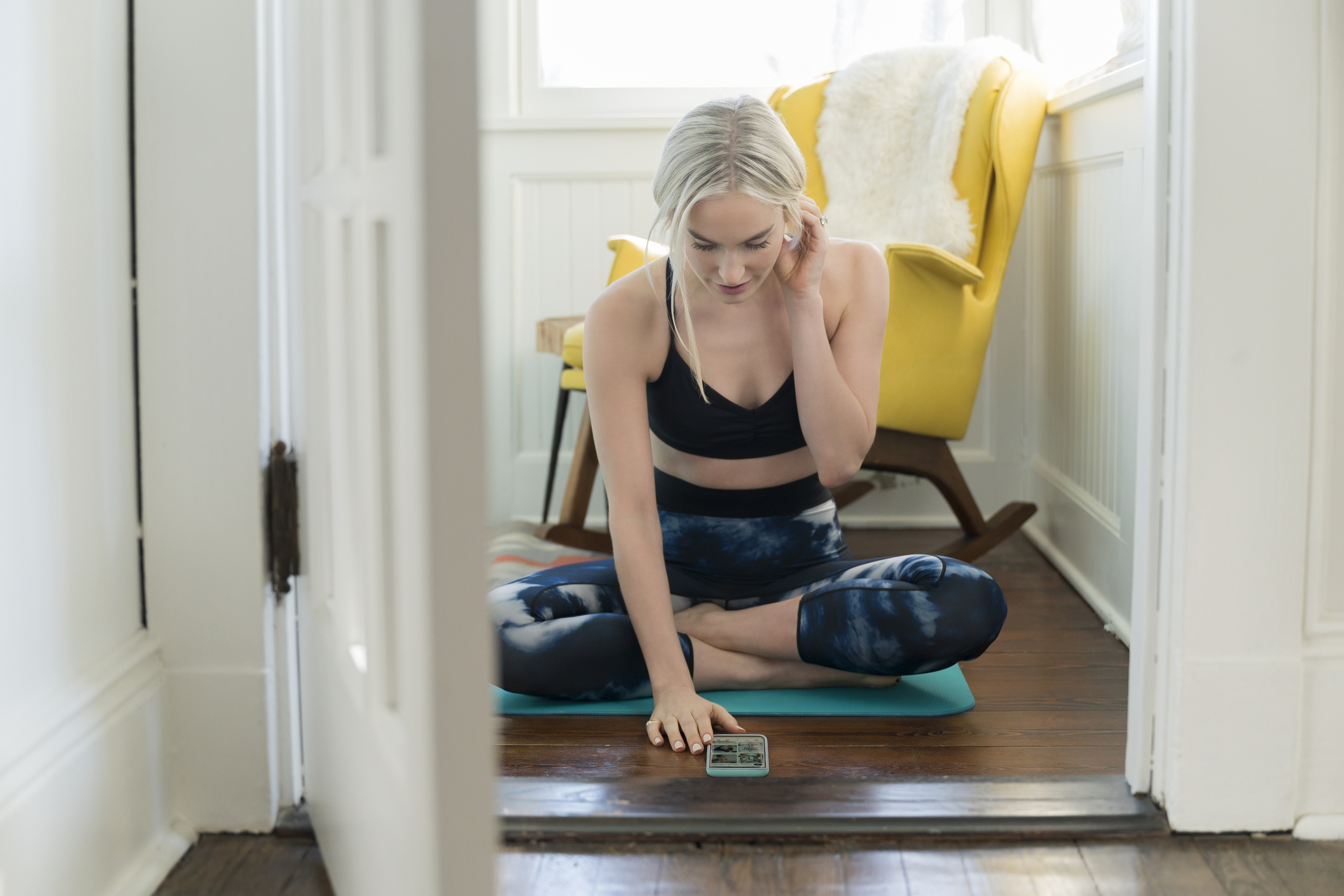
Still suffering from breathlessness, exhaustion and headaches months later? You're not alone.
Perhaps unsurprisingly, search for ‘long Covid symptoms’ is at its highest ever. You'll likely have heard the term, used to describe when a COVID-19 survivor experiences health complications for weeks, and sometimes even months, after they contract the virus.
We bought you news of long Covid clinics opening back in October, but since then, data by the Office for National Statistic has estimated a huge one in 10 people infected with COVID experience long Covid symptoms.
In news today, the doctor heading up NHS England's long COVID response has shared with Sky News that funding will be needed for 'much longer' than currently planned.
Doctor Kiren Collison has said that the 83 UK clinics will likely need to stay open past April next year, when they are planned to close, as patient's symptoms are lasting for longer.
She said: "We need to learn and look at what the demand is. We haven't put a lifespan on them…I'm expecting this to last longer but let's continue to learn and see what the researchers say."
For your complete guide to what long Covid actually is, and how to identify if you’re suffering from long COVID symptoms, keep reading. With an insight from two professionals on what the official NHS symptoms are and guidance on when to see a GP, too.
Celebrity news, beauty, fashion advice, and fascinating features, delivered straight to your inbox!
Remember, no matter how bad it gets, you are not alone, and you will get through this.
What is long Covid?
According to doctor Rajeev Dhar, consultant psychiatrist at Cromwell Hospital’s long COVID clinic, long Covid is simply the term used to describe the effects of COVID-19 in the weeks and months following the initial illness.
"The symptoms of long Covid vary, but typically include fatigue, breathlessness and pain in the chest, joints or muscles," he explains.
As per the NHS website, long Covid, or 'post-COVID-19 syndrome' varies from person to person, as how long everyone takes to recover from the virus varies. Most, the site shares, will make a full recovery within twelve weeks. However, for some individuals, symptoms can last longer, they confirm.
At current, the site states that the chances of having long-term symptoms 'does not seem to be linked to how ill you are when you first get coronavirus'. For example, some coronavirus patients who had mild symptoms when they caught the virus still go on to suffer debilitating long-term health problems.

Who is most likely to get long COVID?
According to doctor Dhar, research carried out by King's College London found that some were at greater risk of suffering from long Covid. "They found that the elderly, female, overweight or asthmatic were more at risk, which reflects what we’re seeing in our clinic."
"There's a real trend of women over the age of 50 presenting with symptoms", he explains.
Though indisputably serious, the condition is still vastly under researched. The working hypothesis, at current, is that long Covid is a type of autoimmune disease, similar to IBS or multiple sclerosis.
What are the symptoms of long COVID?
Of course, as it's a fairly new condition, it's important to note that research is still sorely lacking on helping sufferers return to normality. "We are still learning about it and the effect it has on people," shares doctor Dhar.
But, according to one research paper conducted last year by Greenhalgh and Knight for Am Fam Physician, plus information the NHS website, long Covid symptoms span the following:
- extreme tiredness (fatigue)
- shortness of breath
- chest pain or tightness
- problems with memory and concentration ("brain fog")
- difficulty sleeping (insomnia)
- heart palpitations
- dizziness
- pins and needles
- joint pain
- depression and anxiety
- tinnitus, earaches
- feeling sick, diarrhoea, stomach aches, loss of appetite
- a high temperature, cough, headaches, sore throat, changes to sense of smell or taste
- rashes.
How do you identify if you’re suffering from long Covid symptoms?
As above, there's a whole load of symptoms, and just because you're experiencing them doesn't necessarily mean you've got long Covid.
However, doctor Dhar emphasises that if you are suffering from any of the above symptoms, and have had them for four weeks or more, then to reach out to your GP.
"There are also a number of long Covid clinics being set up to support patients just like you. At ours, we’re creating individual treatment plans for each patient with support for both physical and mental symptoms," he explains. Think help for physical ailments, such as respiratory issues, joint pains and palpitations, and assistance with mental health conditions like insomnia, anxiety, and depression.

So... does long Covid affect your mental health?
While most symptoms are physical, as touched on about, doctor Dhar shares that long Covid also seems to have a lasting effect on mental health too. "Many patients are reporting anxiety, depression and problems sleeping since having the virus," shares the expert.
According to registered psychotherapist and accredited counsellor Charlotte Armitage, this isn't surprising. While there is no scientific research on the impact long Covid has on mental wellbeing at current, anyone experiencing a new illness that lacks in research may feel some degree of fear, she shares.
"Individuals suffering with long Covid are experiencing an illness which is not yet well understood," she explains. "Understandably, this may elicit feelings of fear and anxiety, both of which ultimately have a detrimental impact on psychological wellbeing."
Not only that, but the preliminary research shows that long Covid seriously impacts your quality of life.
Imagine having your day-to-day energy levels, focus and concentration sapped at the same time and then answer this: do you think your mental health would be affected? Short answer is, it's likely.
5 tips for coping with long Covid, if you're currently struggling
Tips for boosting your physical health
1. Go at your own pace
It may not be easy to get back to your usual fast paced lifestyle right now. "This includes working full time, caring for others and exercising," shares Dhar. "It’s important that you go at your own pace and that you are kind to yourself. If you’re struggling with breathlessness or fatigue, try and do things in manageable chunks," the expert recommends.
Our self-care ideas might just help. Check them out.
2. Make sure you’re exercising
Whether this is a walk round the block, a yoga class or a simple stretch, making sure you're exercising will help to maintain and build your muscle strength. "Once you feel happy to, gradually build up the length and intensity of your exercise regime," advises Dhar. This isn't just for the physical benefits, either: exercise also helps with boosting your mood and can help alleviate some mental health concerns associated with long Covid.
Do scroll our guides to the best free home workouts and home workouts you can do with no equipment, for inspiration.
3. Create a routine
You all know that having a routine in place helps to build up a sense of normality. "Start by going to bed and getting up at a similar time each day, and trying to eat at your usual mealtimes," shares Dhar. Do note here, it's important to be realistic. Don't try too much as once while you're still in recovery.
For safeguarding your mental health
4. Focus on what you can control
"This will give you back a sense of control and autonomy over your life which is empowering," explains Armitage. For example, small things like making sure your financial support is in order if you are unable to work will ease your worries day-to-day. "Removing additional stresses created as by-product of living with long Covid will enable you to focus on managing the illness," she shares.
5. Allow yourself to adjust
That is, to whatever level of activity feels comfortable for you right now. "It is ok if you are not able to live your life at the same pace that you did previously," Armitage emphasises. "It’s understandable that this may feel frustrating and upsetting for you, and may even elicit feelings of guilt, too. Try and listen to what your body needs and allow yourself to go with it," she recommends.
"It's been a huge adjustment learning what my body can and can't do."
PR manager Sara Hawthorn has been suffering from long Covid symptoms since she first got the virus in March last year.
"I've had ME-like Long Covid symptoms since I was ill last March - think fatigue, brain fog, aching limbs, and dizziness. It's been a huge adjustment learning what my body can and can't do.
"For example, the weekend before last, I washed the car and painted our garage door, nothing hugely taxing, but on Wednesday I had crash which wiped me out for 3 days. I only started feeling ok again on Sunday."
"I'm waiting on a physio assessment from the Long Covid clinic, but so far there's little doctors seem to be able to do. I'm mostly giving them data and information to help them build a better picture. They've spoken to me about diet and reducing what I do, and mental health and management techniques, but nothing concrete or tangible. I'm not sure what else I can do."
"I've stopped doing a lot of the things I enjoyed, tried to ease my workload, and I feel like I've made my life smaller, but I don't know how much else I can give up. Going from busy and active to being unable to do 'normal' things, like washing the car, in the space of a year is something I don't think I've fully come to terms with yet."

Ally is Marie Claire UK's Senior Health and Sustainability Editor, a well-regarded wellness expert, ten-time marathoner, and Boston Qualifying runner.
Utilising her impressive skillset and exceptional quality of writing, she pens investigative, review and first-person pieces that consistently demonstrate flair and originality.
As well as writing, Ally manages a team of freelancers, oversees all commissioning and strategy for her pillars, and spearheads the brand's annual Women in Sport covers, interviewing and shooting the likes of Mary Earps, Millie Bright, and Ilona Maher. Shortlisted for three BSMEs and winning one in 2022, Ally lives and breathes her verticals: her eye for a story and connections within the wellness sphere are unrivalled. Follow Ally on Instagram for more.
